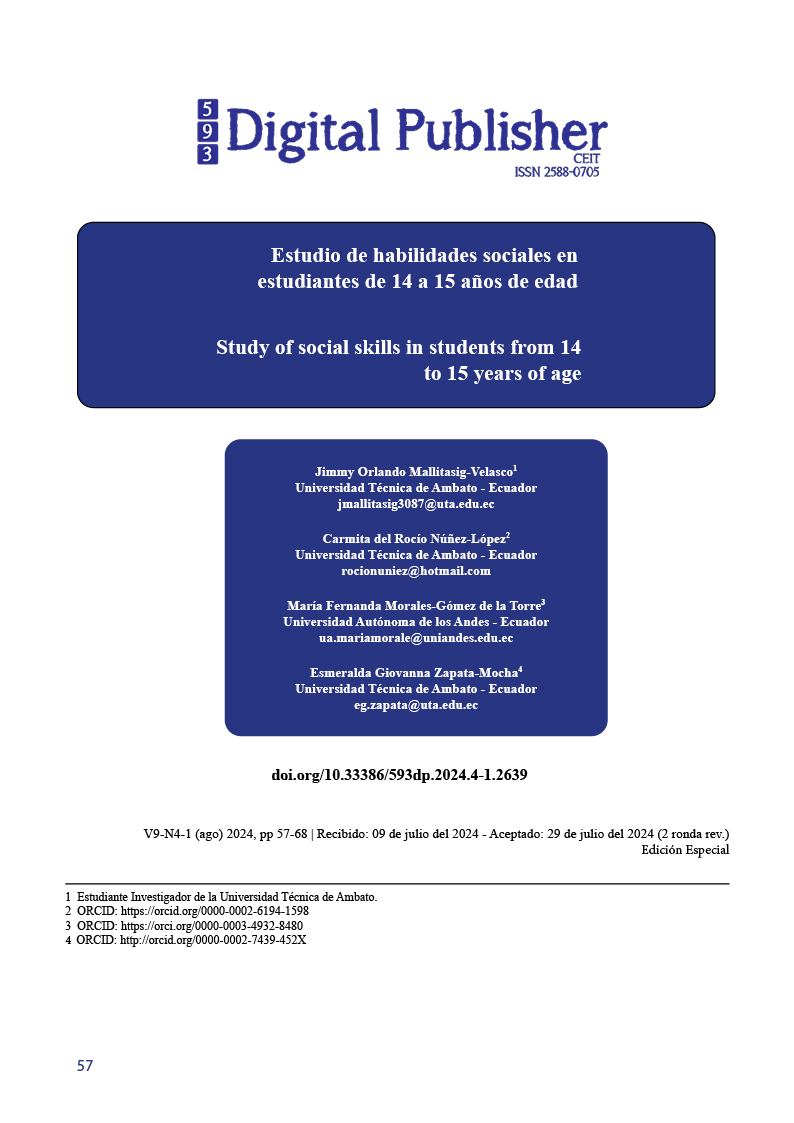Study of social skills in students from 14 to 15 years of age
Main Article Content
Abstract
The present research addresses the study of social skills in students between 14 and 15 years of age whit a population of 15 students, this study tries to identify the level of social skills within the school environment, using the Goldstein Social Skills Scale, which consists of 50 items distributed in six dimensions, a non-experimental and cross-sectional study. The terminology of the questionnaire was verified by means of cognitive interviews with two students and the necessary authorizations were obtained from the educational authorities and parents. The overall results showed that 53.33% of the students achieved a good level of social skills, while 46.67% were at a normal level. There were no students in the excellent, low or deficient levels, indicating an absence of outstanding mastery and significant difficulties in social skills according to Goldstein's criteria. The distribution suggests that most students possess basic competencies in active listening, appropriate conversation, and responding to social cues, enabling them to handle everyday interactions with some effectiveness. However, the lack of students at higher levels indicates that, although present, these skills are not optimally developed. These results underscore the need for training programs and psycho-pedagogical strategies that promote advanced skills such as deep empathy, complex conflict resolution and leadership in social situations.
Downloads
Article Details

This work is licensed under a Creative Commons Attribution-NonCommercial-ShareAlike 4.0 International License.
1. Derechos de autor
Las obras que se publican en 593 Digital Publisher CEIT están sujetas a los siguientes términos:
1.1. 593 Digital Publisher CEIT, conserva los derechos patrimoniales (copyright) de las obras publicadas, favorece y permite la reutilización de las mismas bajo la licencia Licencia Creative Commons 4.0 de Reconocimiento-NoComercial-CompartirIgual 4.0, por lo cual se pueden copiar, usar, difundir, transmitir y exponer públicamente, siempre que:
1.1.a. Se cite la autoría y fuente original de su publicación (revista, editorial, URL).
1.1.b. No se usen para fines comerciales u onerosos.
1.1.c. Se mencione la existencia y especificaciones de esta licencia de uso.
References
Acosta, D., Hernández, P. V., & Onofre, V. (2020). HABILIDADES SOCIALES Y SU IMPACTO EN LA EDUCACIÓN DEL INDIVIDUO . REVISTA DE INVESTIGACIÓN E INNOVACIÓN, 5, 430-449.
Angélico, A., Crippa, J., y Loureiro, S. (2013). TRASTORNO DE ANSIEDAD SOCIAL Y HABILIDADES SOCIALES:UNA REVISIÓN CRITICA DE LA LITERATURA. IJBCT, 6(2). https://doi.org/https://doi.org/10.1037/h0100961
Caballo , V. E. (2007). Manual de Evaluación y Entrenamiento de las Habilidades Sociales. (S. SIGLO XXI DE ESPAÑA EDITORES, Ed.) ISBN 978 84 323 0808 6 .
Collaguazo N, C. A., Fonseca C, F. M., Quispe D, G. A., & Lescano M, J. V. (2023). Desarrollo de habilidades sociales en estudiantes de segundo de bachillerato en una institución educativa de Quito-Ecuador. Desarrollo de habilidades sociales en estudiantes de segundo de bachillerato en una institución educativa de Quito-Ecuador., 7(1). Quito, Ecuador: Ciencia Latina Revista Científica Multidisciplinar. https://doi.org/https://doi.org/10.37811/cl_rcm.v7i1.5270
Cuastumal V, A. R., & Guadalupe G, A. P. (29 de marzo de 2023). Autoestima y Habilidades Sociales en Adolescentes. Autoestima y Habilidades Sociales en Adolescentes, 4(1), 3823–3833-3823–3833. Tena, Napo, Ecuador: LATAM Revista Latinoamericana de Ciencias Sociales y Humanidades. https://doi.org/ https://doi.org/10.56712/latam.v4i1.529
Esteves Villanueva, A. R., Paredes Mamani, R. P., Calcina Condori , C. R., & Yapuchura Saico , C. R. (Junio de 2020). Habilidades sociales en adolescentes y funcionalidad familiar. Habilidades sociales en adolescentes y funcionalidad familiar., 11(1), 16-27. https://doi.org/http://dx.doi.org/10.33595/2226-1478.11.1.392
Goldstein , A. (1978). Escala de evaluación de habilidades sociales. Escala de evaluación de habilidades sociales. https://d1wqtxts1xzle7.cloudfront.net/57124116/266977250-Test-de-Habilidades-Sociales-libre.pdf?1533274565=&response-content-disposition=inline%3B+filename%3DESCALA_DE_EVALUACION_DE_HABILIDADESSOCIA.pdf&Expires=1715181891&Signature=HuYnoj2V1G4TmZcweJwQr9p
Lara Satán, A. A., Lara Satán, N., Velastegui Hernández, R. S., & Pullas Tapia, P. S. (Julio de 2020). Organización y gestión en la prevención de riesgos psicosociales laborales en el transporte público urbano. Organización y gestión en la prevención de riesgos psicosociales laborales en el transporte público urbano, 12(4), 355-362. Revista Universidad y Sociedad.
Moyolema, P., Mayorga, D., Cosquillo, J., y Freire, A. (2024). Habilidades sociales como clave en el éxito académico. 593 Digital Publisher CEIT, 9. https://doi.org/https://doi.org/10.33386/593dp.2024.1-1.2268
Quispe, A. M., Ortega, O. J., & Navarro, B. (2023). Las habilidades sociales en la vida universitaria. Scielo, 7(29).
Santa Cruz , G. B., Albújar Verona, C. E., & Becerra Cerna , E. R. (11 de Octubre de 2023). Habilidades sociales en estudiantes de educación secundaria. Habilidades sociales en estudiantes de educación secundaria., 19(94), 120-128. Conrado. http://scielo.sld.cu/scielo.php?pid=S1990-86442023000500120&script=sci_arttext&tlng=pt
Velastegui, R., Poler, R., & Díaz-Madroñero, M. (27 de Noviembre de 2022). Aplicación de algoritmos de aprendizaje automático a sistemas robóticos multiagente para la programación y control de operaciones productivas y logísticas: una revisión de la literatura reciente. Aplicación de algoritmos de aprendizaje automático a sistemas robóticos multiagente para la programación y control de operaciones productivas y logísticas: una revisión de la literatura reciente. https://doi.org/ https://doi.org/10.37610/dyo.v0i80.643
Zambrano Bermeo , R. N., Londoño Chamorro , K. A., Bolaños Manchabajoy, W., Arocemena Acosta, K., & Estrada González, C. (2023). ESTRÉS ACADÉMICO EN ESTUDIANTES UNIVERSITARIOS EN SITUACIONES DE CRISIS Y EMERGENCIAS. ESTRÉS ACADÉMICO EN ESTUDIANTES UNIVERSITARIOS EN SITUACIONES DE CRISIS Y EMERGENCIAS, 8(3). Enfermería Investiga.





